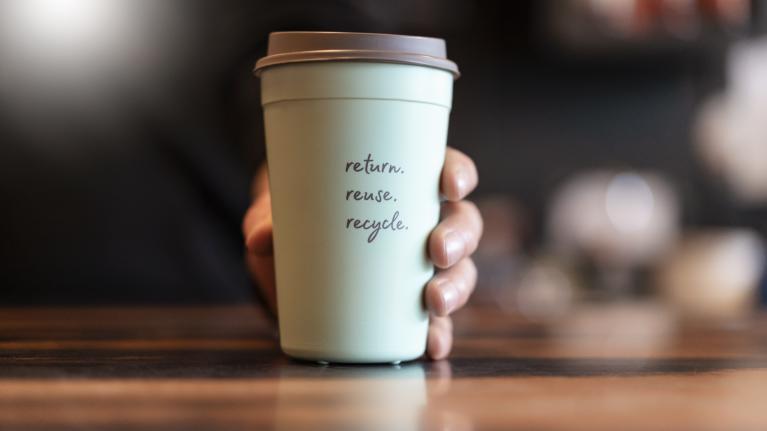
ARE RECYCLABLE AND RECYCLED THE SAME THING?
No. “Recyclable” is a characteristic of a product, packaging or associated component that can be diverted from the waste stream through available processes and programs and can be collected, processed and returned to use in the form of raw materials or products. On the other hand, “recycled material” means that something has been reprocessed from recovered material through a manufacturing process and made into a final product or component for incorporation into a product.1
IS COMPOSTABLE PLASTIC THE ANSWER?
It depends. Compostable plastic can be a solution for certain types of plastic packaging materials which have a high level of food residue that would hamper recycling, and industrial composting can be an alternative recovery pathway for certain types of plastic packaging materials which require specific industrially managed conditions to break down. Although this option has potential, industrial composting infrastructure is not yet widespread globally and, nowadays, the majority of composters do not accept compostable packaging. Check with your local government office or their waste management partner to confirm if any compostables beyond food wastage are accepted in your area. Locally applicable laws, regulations, standards and conditions must be checked by every country.
WHAT’S THE DIFFERENCE BETWEEN EPR FEES AND TAXES?
Extended producer responsibility (EPR) laws set out a national framework where the producer of a product or packaging is required to handle its end of life. Generally, the producer handles this obligation by paying a management fee, based on the weight of packaging materials they place on the market. On the other hand, some countries have chosen to implement plastics taxes. The revenues from these taxes are not always earmarked for improving local waste management infrastructure. Check with your local government to see what fees are being assessed in your supply chain so you can make an informed choice about your packaging purchases.
WHAT’S THE BEST CHOICE YOU CAN MAKE IN SELECTING PACKAGING MATERIALS WITH RESPECT TO CIRCULARITY?
The best choice is to check with your local government about what’s locally collected and actually recycled. You can also explore reuse systems provided by your suppliers to significantly lower the volumes of single use materials you are using. Delivery pallets, vegetable trays and water fountain jugs are great examples of reusable packaging systems today, and many more are coming due to consumer and regulatory initiatives to transform the packaging system. Remember, packaging should also deliver adequate protection to the product so it can minimize food wastage, as these can cause even more environmental impact than packaging itself.
ARE SINGLE-USE PLASTICS PROBLEMATIC FOR THE OUT-OF-HOME INDUSTRY?
Yes, single-use plastic management is a serious issue that requires attention at all levels of public administration. Several governments and organizations operating on the international, regional and national level are already developing policy and actions to address the environmental impact of single-use plastics. For example, in the EU, a Single Use Plastics Directive forbids many countries from using disposable polystyrene food containers, cutlery or straws.2 Also, the United National Environment Program (UNEP) is currently hosting an intergovernmental negotiation to develop a legally binding Treaty on Plastics Pollution.3 Please consider that legislation and regulations are constantly changing and can vary from one country to another. 4 Checking with your local environment office is the best way to stay current on developments in your country.
Access the full Planetpro “Keep Packaging In The Loop” edition : Click HERE
Sources
1. ISO 14021:2016 - Environmental labels and declarations
2. DIRECTIVE (EU) 2019/904 on the reduction of the impact of certain plastic products on the environment
3. UN Environment Program: Intergovernmental negotiating committee (INC) on Plastic Pollution
4. Addressing Single-Use Plastic Products Pollution, Available at: https://wedocs.unep.org/handle/20.500.11822/35110